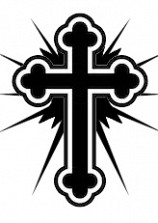 Kolo Srpski Sestara
Kolo Srpski SestaraOn October 13, 1929, the Kolo Srpskih Sestara of St. Nicholas Serbian Orthodox Church of Steelton, Pennsylvania was established. This had been a dream of Mrs. Marica Brkovich. She together with Mrs. Ruzica Trbovich, Mrs. Katica Sunajko, Mrs. Smilja Akimovich and Mrs. Helen Borota dedicated themselves to this beginning.
This all began in the kitchen of Mrs. Milka Linta where the women would gather to chat, catch up on the news and discuss the various topics of the day. Often their talks would center upon the needs of the parish and its surrounding community. They canvassed door to door and finally enrolled 94 women who met and accepted as their Krsna Slava, Pokrov Bogorodice (Protection of the Most Holy Mother of God).
Mrs. Sunajko was the first President, Vice-President was Mrs. Brkovich, Secretary was Mrs. Trbovich and Treasurer was Mrs. Borota. On the advisory committee were Mrs. Akimovich and Mrs. Milka (Teta) Linta.
In the summer of 1930, the organization was joined by junior members, young teens who were required to pay only 10 cents for membership. They were fondly referred to as dime members. Two of these junior members were with the organization for their entire lives: Dorothy Matich and Alma Stanovich, both of whom were past presidents.
By 1933 the Steelton Kolo was considered one of the best and largest in America. It is a member of the Eastern Region of the National Federation of Kolo Srpskih Sestara. During the depression, it found ways to sustain the church, beautify the Social Hall and help acquire the church properties.
During World War II, the Kolo knitted sweaters, scarves and socks for the needy and solicited for the Red Cross and other service organizations.
The Kolo purchased the Iconostas for the old church as well as the one for our new church. The Kolo also purchased the chandelier which graces the center of our church. The Kolo contributes to our Diocese, supports the children's camp at Shadeland, PA, and, in recent years, Monastery Marcha and orphans affected by the war in the old country.
Today the Kolo continues to support the church and its related functions to the best of its ability
